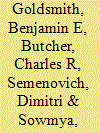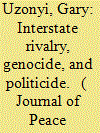| Srl | Item |
| 1 |
ID:
122897


|
|
|
|
|
| Publication |
2013.
|
| Summary/Abstract |
We present what is, to the best of our knowledge, the first published set of annual out-of-sample forecasts of genocide and politicide based on a global dataset. Our goal is to produce a prototype for a real-time model capable of forecasting one year into the future. Building on the current literature, we take several important steps forward. We implement an unconditional two-stage model encompassing both instability and genocide, allowing our sample to be the available global data, rather than using conditional case selection or a case-control approach. We explore factors exhibiting considerable variance over time to improve yearly forecasting performance. And we produce annual lists of at-risk states in a format that should be of use to policymakers seeking to prevent such mass atrocities. Our out-of-sample forecasts for 1988-2003 predict 90.9% of genocide onsets correctly while also predicting 79.2% of non-onset years correctly, an improvement over a previous study using a case-control in-sample approach. We produce 16 annual forecasts based only on previous years' data, which identify six of 11 cases of genocide/politicide onset within the top 5% of at-risk countries per year. We believe this represents substantial progress towards useful real-time forecasting of such rare events. We conclude by suggesting ways to further enhance predictive performance.
|
|
|
|
|
|
|
|
|
|
|
|
|
|
|
|
| 2 |
ID:
160534


|
|
|
|
|
| Summary/Abstract |
Interstate rivalry not only influences a country’s international behavior, but also its domestic conduct. Here, I focus on the connection between interstate rivalry and domestic government mass killing, specifically genocide and politicide. I argue that interstate rivalry has both direct and indirect influences on a government’s decision to use mass violence against its civilian population. Directly, countries engaged in rivalry experience a heightened state of military tension, which increases the likelihood that the country will resort to political mass killing when handling domestic dissent. Indirectly, rivalry increases the likelihood of both inter- and intrastate conflict, which also increases the likelihood of genocide and politicide. Statistical analysis of all country-years from 1955 to 2011 reveals that interstate rivals are more likely to engage in genocide and politicide than are other states. This research illustrates the way in which interstate rivalry influences a state’s domestic politics and shapes the interactions between government and population. It also highlights the importance of how the international threat environment affects a state’s willingness to engage in domestic political mass murder. These findings indicate that rivals do not only engage in the most violent interstate behavior, but also some of the deadliest domestic politics, as well.
|
|
|
|
|
|
|
|
|
|
|
|
|
|
|
|